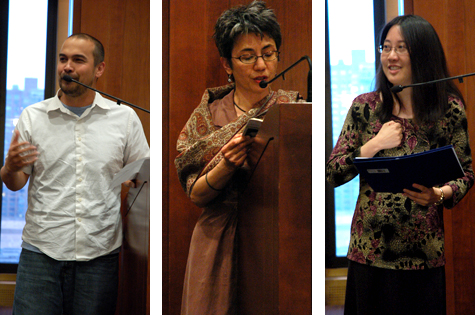
From June 15th-19th, two Lantern Review staff members (Editor Iris A. Law and Staff Writer Henry W. Leung) attended the 2011 Kundiman Poetry Retreat at Fordham University in New York City. What follows are our reflections on our experiences there.
* * *
I. Iris
A few weeks ago, I stepped out of a D train in the Bronx and trundled my suitcase up the hill toward my very first Kundiman Retreat. Fordham Road greeted me with its jumble and racket: taxis honked their way down the street; motorcycles revved; teenagers laughed over the tinkling of a Mr. Softee van; shop owners shouted from behind racks of merchandise that spilled colorfully onto the sidewalk; a child descended uneasily from a bus and promptly vomited on the pavement. It felt strange to enter the gated, manicured space of the Rose Hill campus—ostrich-like; irresponsible, almost. But once swaddled into this beautifully (even eerily) verdant setting, it was also difficult not to feel that this was a space that in some way enacted the purpose of Kundiman: a place in which the creative soul could clear space within itself so that new patches of greenness could be sown and take root—not in isolation from the world, but in juxtaposition with, and in the context of, the world. I was reminded of something that I’d read in an interview Sarah Gambito gave to The Fordham Observer. In order to write in New York, she remarks, she tries “to be as still as [she] can in the city.” Indeed, to be a writer is to live in a position of simultaneous privilege and responsibility. As participants in social communities, we hold a responsibility to live fully in the world, so that we can write into, for, and from those communities. But at the same time, the work of the writer cannot be completed without the ability to occasionally take a step back: to be a still, small, open receptacle to the world, but a simultaneous processor of that world. And the lens with which we process—with which we must enact our craft—requires, from time to time, the ability to allow ourselves space to wrestle with the work itself, and with the world surrounding the work.
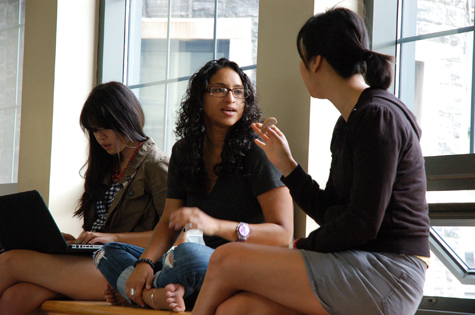
I shared during Closing Circle (the final, reflective gathering of the weekend) that—as cliché as it may sound—the retreat felt like a gift to me. I came to New York expecting to take a step back from the world in order to write and to be in the presence of other writers; to expend great swaths of time developing projects; to workshop; and to make some engaging new friendships with other Asian American poets. But my experience of the retreat was, in fact, more like a step deeper into the experience of being a writer in the world—of being a poet in context.
Kundiman felt like a gift to me—as a writer, and as an Asian American-identified poet—not solely because of the writing I was able to do and the people that I met, but because I came away from the weekend feeling deeply nourished. Throughout the weekend, I was constantly being given small treasures—little tokens of wisdom, practical help, assurance, goodwill—by the faculty, by the staff, by the other fellows. Timothy Yu offered his advice and his ear (and gave up the chance to eat his dinner in peace) one evening when he allowed me to grill him about PhD programs in literature; Karen An-hwei Lee listened to me and offered me wisdom about faith and writing; Jon Pineda shared insights about envisioning pause and pacing in a manuscript; Kimiko Hahn opened the weekend with the invitation to “give ourselves permission” and encouraged us to make our writing time precious, even if that time was limited to ten minutes in the parking lot every morning; Sarah Gambito shared earnestly and encouragingly about the struggles she’d gone through while adjuncting; Oliver de la Paz offered advice about setting priorities in teaching and writing, and helped me to shape the jumble of vaguely-related poems that had grown out of my thesis into a new vision for a manuscript. There were practical gifts: a submissions spreadsheet model from Oliver de la Paz; leads on job opportunities from several of the fellows; the suite of prompts that Kimiko Hahn led us in creating and sharing during my last workshop; the insightful, concrete feedback that my home group gave me; the exquisite corpse poem the fellows secretly created as a thank-you for the staff. And there were immaterial gifts, too: the courage of the poems shared during salon; the river song that Misha Chowdhury sang to open the reading; the warmth, generosity and humility present amongst the members of my workshop group as they carefully critiqued each fellow’s work.
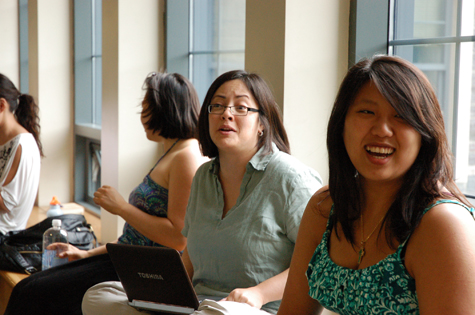
I left the weekend feeling full: with a renewed sense of purpose both for myself as an artist, and for the editorial vision of LR. Over and over again, I was reminded of our self-imposed imperative to curate a publication space in which the crazy, slippery thing that we call “Asian American poetry” can be simultaneously performed and interrogated. As Kimiko Hahn remarked during Timothy Yu’s presentation on the literary history of Asian American poetry, when we try to talk about what Asian American poetry is, we often end up “finding more of a description than a definition.“
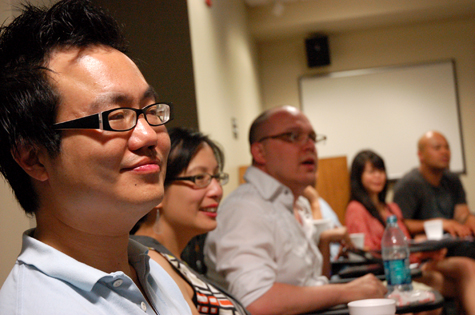
Indeed, that is exactly what Mia and I constantly wrestle with whenever we vision for LR. How, we ask ourselves, can we provide a space that is descriptive rather than prescriptive, messy rather than precise, illuminative rather than obscurative? A space that, in other words, enables the playing-out of central questions about the relationship between poetry and community. As Sarah Gambito remarked during Closing Circle, “The poet needs to be able to see and write what our communities can’t say or do. How can a community see if the poets don’t?”
But the call to transformative illumination extends far beyond the work of the individual poet, or even the work of the editor. To quote Sarah once again: “Illuminative living, clear-sighted living, joyful living. That’s what a poem is.”
“Take the light back,” she urged us. And so that’s what I’m doing here.
* * *
II. Henry
Kundiman means “love song.” Joseph Legaspi noted in an assignment to my workshop home group: “They say every poem is a love poem. Is it? Kundiman is a love poem. It is.” Sarah Gambito said at our Lincoln Center reading, “What is the truth? Our story, on our terms.” Jennifer Chang sent us a letter for Opening Circle that included this exhortation and reminder: “Be the poem you want to write. Then write it.” I was reminded of Jacqueline Woodson who wrote some years ago, “Name all the people / You’re always thinking about / People are poems.” And of an old friend arguing with pre-med students that medicine only delays death, but poetry—“Poetry saves lives.”
How far we’ve come from T.S. Eliot’s occlusive “Tradition” and from self-denying High Modernism! Wordsworth, I have read, tried for a while to speak in verse, grafting poetic form onto his conversations throughout the day. It was a failed, pretentious experiment. What if, instead, he had met this year’s Kundiman Fellows and understood that one need only live in verse? That, in the end, poetry’s bottom line is not adroitness but acquaintance?
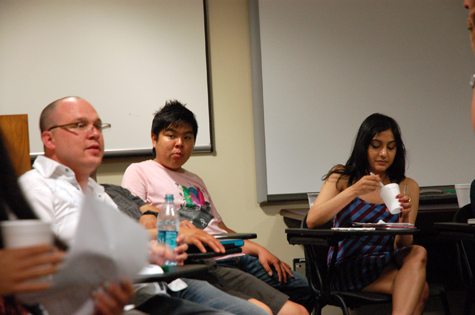
When we gathered in the lounge of O’Hare Hall, the usually softspoken Karen An-hwei Lee shouted that we were “Hot lava!” It’s no wonder the themes arising from this Kundiman Retreat melted a boundary between the poet and the poem—that estrangement we effect when we’re afraid to invest and represent ourselves in language. We spoke endlessly of permissions and fearlessness. The honey badger, which suffers bee stings and snake bites even as it chews its meals, was a kind of mascot. In our poems and conversations, we shared intimacies in a spirit that “confessional” poetry today often lacks in its sensationalism: a spirit of sanctity, of trust in the listener, of trust in the absolution. Graduating Fellow Helene Achanzar told us that she couldn’t sleep at night—she felt so known, so filled with joy, she didn’t want that vitality to end. I felt the same way, and as the Kundiman Retreat capped off a year of many transitions for me, I thought: We frequently change (Miles Davis: “I have to change, it’s like a curse”) but how often do we get to awaken?
It was a privilege to work with instructors Kimiko Hahn, Karen An-hwei Lee, and Jon Pineda. A privilege to workshop with Matthew Olzmann, graduating Fellow and winner of the Kundiman Poetry Prize, whose humor and wisdom were equally instructive. A surprise and privilege to meet Esther Lee, whose book I’d reviewed before I knew I’d meet her, and to see her process. A privilege to learn from all the adjuncts and professionals who are making it in the “real world,” and from Fulbright scholar-poets Misha Chowdhury, Tarfia Faizullah, and Jane Wong. A blessing to workshop with Carolyn Ho, who read my poems with more acuity than anyone I’ve known.
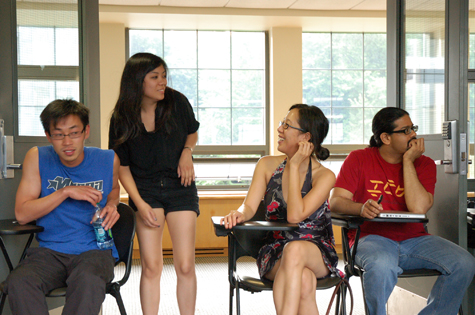
But illuminated craft was the least of the gifts I received from Kundiman; casting beyond it, Oliver de la Paz completely reframed my perspective on publication. (In fact, I was sketching Keating Hall from a park bench as I waited for our meeting, and when he called me over to his bench, I noted how different the building looked after a walk of just thirty feet). For the longest time I’ve been angry and anxious about the system in place, the way that submitting work to journals and contests can be a sordid rolling of the bones. I was worried about making a living out of my writing; he taught me instead to make a life out of it. He described publication as a part of the writing process, a way to find out if your work is ready—and if so, ready for whom, for what audience? In other words, what homes will you find for your poems and for yourself?
I have never felt so grounded as a writer, so sure of my place. I no longer need to identify as a writer of Asian American background in protest of being misunderstood; I can now identify as such knowing I have been understood, and can again, and because I have a love song to write. Once community has been found, the pressure of the citizen-poet seems to change from filling in negative or margin space to celebrating an open space. Since before Romanticism, our culture has been obsessed with the figure of the individual genius. But, in language, how much can we claim belongs to the individual? I place myself in a larger Asian American neighborhood believing that brilliance is a collaborative, fortunate, even miraculous, lifelong accumulation of words and their joy, of words and their grotesqueness.
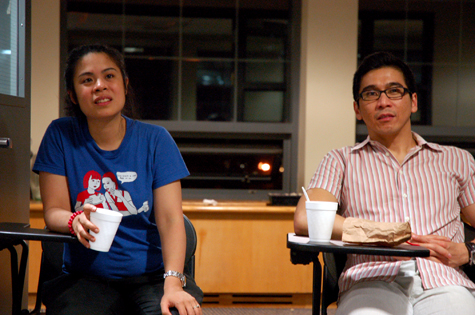
And I hold that poetry is not a duty. Duties are burdens. It’s a commonplace to say that artists and creators are products of their communities. But we are entering an internet eternity of uncertain ownership (in a wireless society, what does it mean to belong or be dispossessed?), and though the universe may be contracting, it is only getting more complex. Today, we get to will our communities into being; we get to nurture our sources of nurture. As Kimiko Hahn said at the reading, “Who says you can’t choose your family?” During the third-year Fellows’ graduation, they were given turtle charms as a symbol, for the turtle carries its home on its back everywhere; and now we, too, have a home to carry forth. I want to end this with love and respect for the Kundiman Fellowship and its community, for Kundiman means “love song,” and fellowship means we are all in this boat together.
Thank you both for joining the Kundiman circle! It was such an honor to break bread with you.
Thank you for this blog/journal, a lovely and loving reminder of our retreat into (yes!) permission. Your powerful images are a proof of powerful writing. And I thank you/Kundiman. Again.
Thank you, Oliver!
Thank you, Kimiko! We are humbled to have had the chance to learn from you.